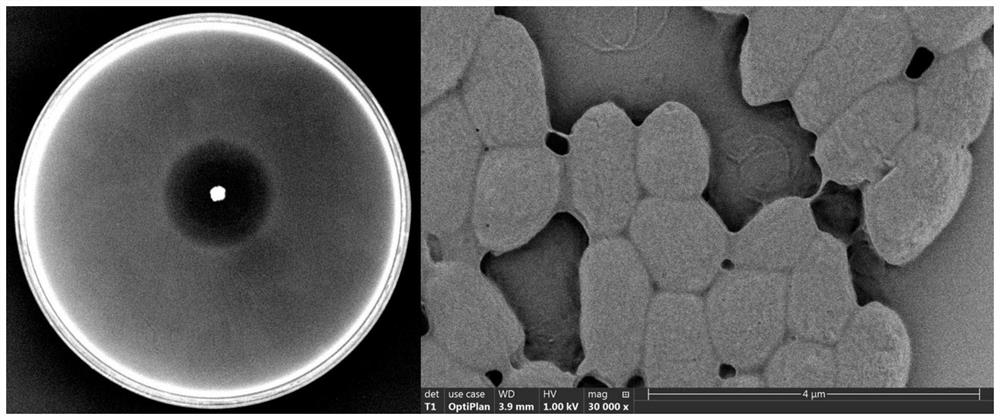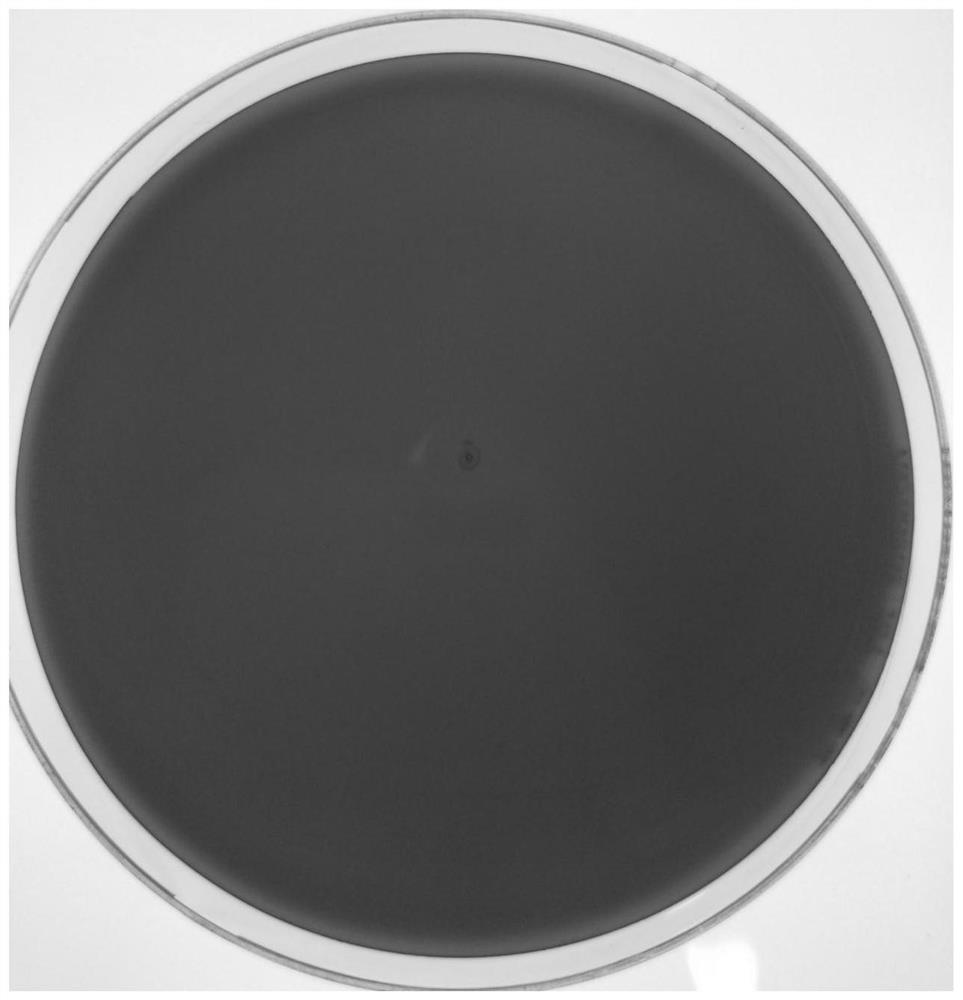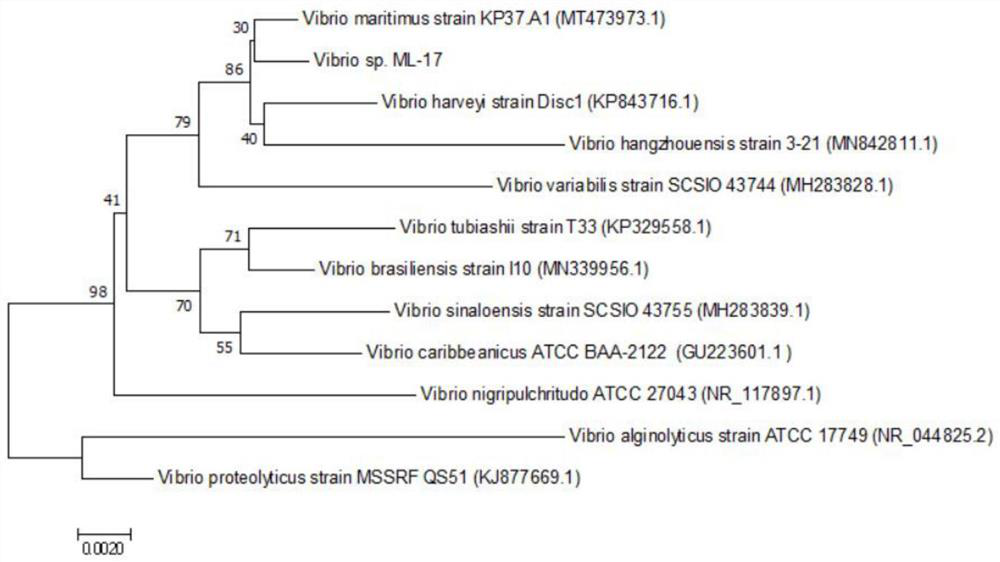Vibrio maritimus capable of producing alginate lyase with good thermal stability and application
A technology of alginate lyase and thermal stability, applied in the field of microorganisms, can solve problems such as patent publications and the like that have not yet been found, and achieve the effects of good thermal stability and short growth cycle
- Summary
- Abstract
- Description
- Claims
- Application Information
AI Technical Summary
Problems solved by technology
Method used
Image
Examples
Embodiment 1
[0041] The isolation and identification of embodiment 1 bacterial strain
[0042] The following experiments were performed under sterile conditions.
[0043] 1. Enrichment of strains
[0044] Under sterile conditions, use a small hammer to break the shell, take out the spirochete, pick out the intestinal tract with scissors, briefly immerse in 75% ethanol to sterilize the surface, add it to a Erlenmeyer flask containing 100mL 2216E medium, 28 Cultivate for 48 hours at ℃, and then serially dilute the enriched sample to 10 -7 100 μL of samples from each gradient were evenly spread on a 2216E culture plate with sodium alginate as the sole carbon source, cultured at 28°C for 48 hours, and the growth of colonies was observed.
[0045] The preparation method of the 2216E medium is: peptone 5g, yeast extract powder 1g, ferric citrate 0.1g, sodium chloride 19.45g, magnesium chloride 5.9g, magnesium sulfate 3.24g, calcium chloride 1.8g, potassium chloride 0.55 g, sodium bicarbonate ...
Embodiment 2
[0060] Embodiment 2 The mensuration of marine Vibrio optimum growth condition of the present invention
[0061] The strains were inoculated in 2216E medium with sodium alginate, glucose, sucrose, starch, and xylose as the only carbon source, cultured at 30°C for 12 hours, and the relative biomass was determined to be 100%, 54.15%, 73.65%, and 92.5%, respectively. , 15.6%, and the relative enzyme activities were 100%, 0%, 37.6%, 55.45%, and 2.25%, respectively. The result is as Figure 4 shown. Prove that the optimum carbon source for the growth and enzyme production of this strain is sodium alginate.
[0062] The strains were inoculated in 2216E medium with yeast extract, tryptone, ammonium sulfate, and ammonium chloride as the only nitrogen source, cultured at 30°C for 12 hours, and the relative biomass was determined to be 78.85%, 100%, 49.45%, and 40.85%, respectively %, relative enzyme activities were 81.55%, 100%, 37.6%, 60.55%, 67.7%. The result is as Figure 5 show...
Embodiment 3
[0067] Embodiment 3 The enzymatic property determination of marine Vibrio of the present invention
[0068] 1. Determination of optimum temperature
[0069] The strain was cultured at 30°C for 12 hours, and the supernatant was measured by DNS method under the conditions of 25, 30, 35, 40, 45, 50, 55, and 60°C respectively. The relative activity of alginate lyase was 60%, 83.7%, 91.8%, 100%, 92.6%, 72.5%, 39.4%, 6.6%. The result is as Figure 10 shown. It is proved that the alginate lyase produced by this strain reaches the highest enzyme activity at 40°C.
[0070] 2. Determination of heat resistance
[0071] The strain was cultured at 30°C for 12 hours, and its supernatant was heat-treated at 40, 45, 50, and 55°C for 5, 15, 30, 60, 90, and 120 minutes, respectively, and the relative activity of alginate lyase was determined by DNS method , 97.3%, 95.8%, 91.1%, 87.4%, 79.1%, 65.9% after heat treatment at 40°C, 91.1%, 88.6%, 78.4%, 66.4%, 44.3%, 32.7%, 50% after heat treatm...
PUM
| Property | Measurement | Unit |
|---|---|---|
| Diameter | aaaaa | aaaaa |
Abstract
Description
Claims
Application Information
 Login to View More
Login to View More - R&D
- Intellectual Property
- Life Sciences
- Materials
- Tech Scout
- Unparalleled Data Quality
- Higher Quality Content
- 60% Fewer Hallucinations
Browse by: Latest US Patents, China's latest patents, Technical Efficacy Thesaurus, Application Domain, Technology Topic, Popular Technical Reports.
© 2025 PatSnap. All rights reserved.Legal|Privacy policy|Modern Slavery Act Transparency Statement|Sitemap|About US| Contact US: help@patsnap.com



